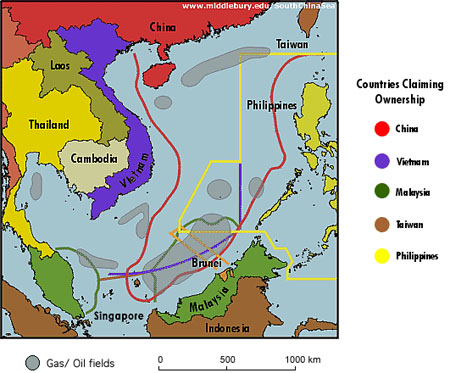An increasingly fractious maritime confrontation is developing in the South China Sea, with enormous implications for international companies interested in developing East Asia's offshore hydrocarbon resources.

Far from the radars of London and Wall Street investors, the clash sees Vietnam emerge as spear carrier for its fellow ASEAN members on the dispute.
Offshore drilling is the most capital-intensive form of exploiting hydrocarbons, but its expense and scarcity has allowed technically advanced Western companies to drive hard bargains with third-world countries over their offshore waters, as they don't have the advanced technical resources or finances to exploit their maritime wealth.
Most countries attempt to procure the best bilateral deals with foreign companies for a taste of the offshore revenues that come from exploiting their exclusive economic zones (EEZs), which the 1982 UN Convention on the Law of the Sea (UNLOS) recognized 12 nautical miles as normal for territorial waters and provided international recognition of 200-mile EEZs.
Overlapping Claims
When an overlap occurs, UNLOS defers to competing states to negotiate/delineate their final and actual maritime boundary, with the general principle that any point within an overlapping area defaults to the nearest state.
According to U.S. government statistics, Vietnam's oil and gas industry is currently its biggest foreign currency earner and a major procurer of imported technology. Since Vietnam's first oil export in April 1987, oil has earned over $17B for its economy—all of it from offshore production.
Vietnam is currently Asia's third-largest oil producer behind Indonesia and Malaysia.
China's expansive South China Sea-sovereignty claims puts Beijing directly in conflict with sovereignty claims and security of five SE Asian states—Vietnam, the Philippines, Malaysia, Brunei and Indonesia, not to mention irredentist claims on Taiwan. All, except Taiwan, are ASEAN members.
Vietnam now emerges as plucky David challenging Beijing's Goliath.

























































